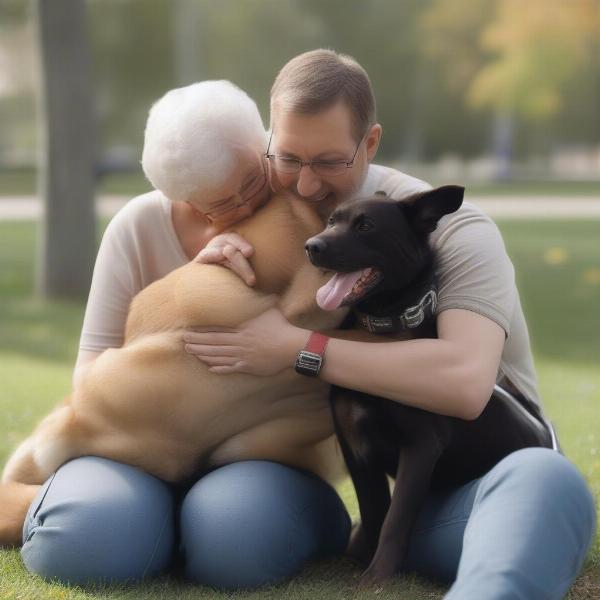Adopting a retired service dog can be an incredibly fulfilling experience. These dogs have dedicated their lives to assisting others, and now they deserve a loving home where they can relax and enjoy their retirement. This article provides valuable insights into what to expect when you adopt a retired service dog, ensuring a smooth transition for both you and your new companion.
Understanding the Needs of a Retired Service Dog
Retired service dogs, while generally healthy, may have specific needs due to their previous work. Some may have minor physical ailments, such as arthritis or hip dysplasia, while others might experience anxiety or stress in new environments. It’s essential to be prepared to address these potential challenges with patience and understanding.
What does adopting a retired service dog entail? Firstly, it requires a commitment to providing a stable and nurturing environment. These dogs thrive on routine and clear boundaries, so consistency is key. Secondly, be prepared to adapt to your dog’s specific needs. This might involve adjusting your lifestyle to accommodate their physical limitations or providing them with extra emotional support. Finally, remember that these dogs are individuals with their own unique personalities and quirks. Getting to know your retired service dog and building a strong bond based on trust and mutual respect is paramount.
Preparing Your Home for a Retired Service Dog
Creating a safe and welcoming space for your new companion is crucial. Before bringing your retired service dog home, ensure your house is dog-proofed. Remove any potential hazards, such as toxic plants or loose wires. Provide a comfortable bed in a quiet area where your dog can retreat when they need some downtime. Establishing a consistent feeding schedule and designated potty area will also help your dog adjust quickly.
Are you prepared for the financial commitment? Adopting a retired service dog can involve costs related to veterinary care, food, toys, and other supplies. While adoption fees are typically lower than purchasing a puppy, it’s essential to be financially prepared for unexpected expenses that may arise due to pre-existing conditions.
Building a Bond with Your Retired Service Dog
Patience and understanding are essential when building a bond with a retired service dog. Avoid overwhelming your new companion with excessive attention or demands. Allow them to adjust to their new surroundings at their own pace. Positive reinforcement training methods are highly effective with these intelligent dogs. Short, frequent training sessions focused on basic commands can help build confidence and strengthen your bond. Engaging in activities your dog enjoys, such as gentle walks or playtime in the yard, can further solidify your connection.
How can you tell if your retired service dog is settling in? Look for signs of relaxation, such as a wagging tail, soft eyes, and a willingness to interact with you. Remember, building a strong bond takes time and patience, but the rewards are immeasurable.
 Owner bonding with retired service dog
Owner bonding with retired service dog
Conclusion
Adopting a retired service dog is a rewarding experience that offers a unique opportunity to provide a loving home to a deserving animal. By understanding their needs, preparing your home, and building a strong bond based on trust and respect, you can ensure a happy and fulfilling retirement for your new companion. Remember, adopting a retired service dog is not just about giving them a home; it’s about welcoming a hero into your heart.
FAQ
- Are retired service dogs good with children? It depends on the individual dog. Some retired service dogs are excellent with children, while others may prefer a quieter environment. It’s essential to discuss this with the adoption organization.
- Do retired service dogs still need training? While they have extensive training, reinforcing basic commands and setting clear boundaries is beneficial for a smooth transition.
- How much exercise does a retired service dog need? Their exercise needs vary depending on their age and health. Consult with your veterinarian to determine an appropriate exercise plan.
- What are the common health issues in retired service dogs? Arthritis, hip dysplasia, and other joint problems are common due to their previous workload.
- Where can I adopt a retired service dog? Several reputable organizations specialize in placing retired service dogs. Research thoroughly to find a reputable organization.
- What is the adoption process like? It typically involves an application, home visit, and meet-and-greet with the dog.
- Are there any special considerations for adopting a retired service dog with disabilities? Yes, be prepared to adapt your home and lifestyle to accommodate their specific needs.
ILM Dog is a leading international pet website dedicated to providing expert advice on dog care and wellbeing. We offer valuable resources on dog breeds, health, training, nutrition, grooming, and much more. From choosing the right breed to understanding the specific needs of senior dogs, ILM Dog provides practical guidance for dog owners of all levels. Contact us at [email protected] or +44 20-3965-8624 for expert advice and support.